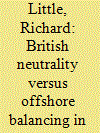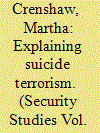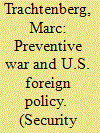| Srl | Item |
| 1 |
ID:
077000


|
|
|
|
|
| Publication |
2007.
|
| Summary/Abstract |
The American Civil War is an important test case for offensive realism because it was the last occasion when offshore balancing by Britain could have prevented the United States from becoming a regional hegemon. Instead, Britain drew on the norm of nonintervention to justify a policy of neutrality. Offensive realists reject the idea that Britain was constrained by normative considerations but disagree about why Britain failed to operate as an offshore balancer. I acknowledge the importance of the offensive realists' regionalized approach to the international system, but use English School thinking to argue that the normative framework that Britain and the United States subscribed to must be taken into account to provide a coherent explanation of Britain's response to the Civil War. Detailed archival research demonstrates that despite concern about u.s. regional hegemony, Britain was unequivocally constrained by normative considerations. The case study suggests, therefore, that societal constraints were stronger than systemic ones
|
|
|
|
|
|
|
|
|
|
|
|
|
|
|
|
| 2 |
ID:
077001


|
|
|
| 3 |
ID:
076998


|
|
|
|
|
| Publication |
2007.
|
| Summary/Abstract |
This article examines the claim that the Bush strategy of dealing with developing threats "preemptively" marked a total break with American tradition. It turns out that preventive war thinking played a much greater role in shaping u.s. policy than most people realize. During the early Cold War period, this sort of thinking was by no means limited to the lunatic fringe. Could the United States simply sit back and allow first the Soviets and then the Chinese to develop nuclear capabilities of their own? Many people, both inside and outside the government, were worried about what would happen if America did nothing and thought that the possibility of preventive action had to be taken seriously. In the post-Cold War period, the Clinton administration seemed ready to do whatever was necessary to prevent North Korea from going nuclear; it seemed prepared, in fact, to go to war over the issue. Even in the pre-nuclear world, preventive war thinking played a major role in shaping policy: American policy in 1941 was strongly influenced by this kind of thinking.
|
|
|
|
|
|
|
|
|
|
|
|
|
|
|
|
| 4 |
ID:
076999


|
|
|
|
|
| Publication |
2007.
|
| Summary/Abstract |
The theory of "preventive war" states that, under certain conditions, states respond to rising adversaries with military force in an attempt to forestall an adverse shift in the balance of power. British and French passivity in response to the rapid rise of Germany in the 1930s would appear to constitute one of the leading empirical anomalies in the theory, one the theory's proponents must explain. After clarifying the meaning of the preventive motivation for war and specifying the conditions under which it should be the strongest, we examine French and British behavior in the crises over the Rhineland in 1936 and Sudeten Czechoslovakia in 1938 through an intensive study of government documents and private papers. We argue that French political leaders, anticipating a continuing adverse shift in relative power, wanted to confront Hitler, but only with British support, which was not forthcoming. British leaders believed, even by 1936, that the balance of power had already shifted in Germany's favor, but that German ascendancy was only temporary and that British rearmament would redress the balance of power in a few years. We contrast our argument with alternative interpretations based on domestic political pressures and ideologically driven beliefs and interests
|
|
|
|
|
|
|
|
|
|
|
|
|
|
|
|